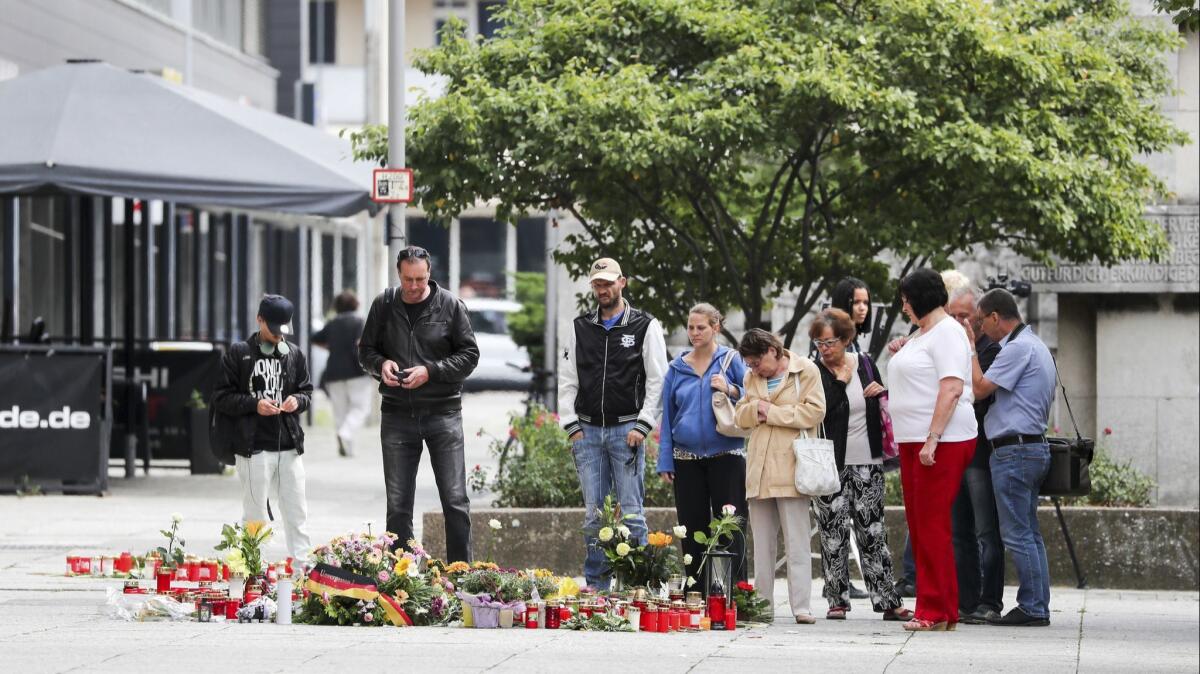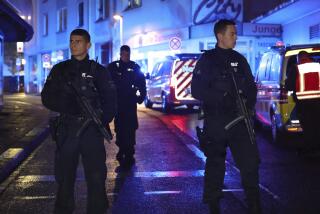German government offers to send federal police to Saxony state to keep peace after violent far-right protest

Reporting from BERLIN — The German government on Tuesday offered to send police reinforcements to the eastern city of Chemnitz where right-wing extremists late Monday clashed with left-wing opponents.
Authorities in Saxony state acknowledged that they were overwhelmed by the extraordinarily large group of 6,000 neo-Nazi demonstrators who battled a group of about 1,500 anti-fascists and migrants.
The far-right extremists were bent on vigilante justice, chasing and attacking foreigners, after a German man was killed in a scuffle with migrants.
German Chancellor Angela Merkel on Tuesday denounced the wave of wanton lawlessness that erupted.
The tension between Germans and foreigners has long been smoldering in Saxony, a poor state south of Berlin that has become a flashpoint of resistance to Merkel’s open-door policies welcoming about 1.4 million Syrian refugees over the last three years.
Even though relatively few foreigners and refugees live in the state bordering Poland and the Czech Republic, xenophobic sentiment has made the anti-migrant Alternative for Germany party stronger in Saxony than anywhere else in Germany.
“We’ve seen video clips of mobs filled with hatred hounding down others on the streets, and I can hardly say it more clearly that this has absolutely nothing to do with a state based on the rule of law,” Merkel told reporters in Berlin.
Like many other German leaders and ordinary Germans aghast at the anti-foreigner violence in a country that has for decades worked hard to try to atone for its Nazi past, Merkel said she was pleased that Interior Minister Horst Seehofer had extended an offer to the Saxony state police to send in reinforcements to help try to get the situation under control.
Merkel herself has faced intense protests and rude shouts to resign when campaigning or appearing in Saxony, mainly because of her 2015 decision to allow refugees from Syria and elsewhere stranded in Hungary to travel freely to Germany.
“We cannot allow this kind of rioting to take place on any street anywhere in Germany,” she said.
The trouble in Chemnitz, about 110 miles south of Berlin, began early Sunday after the stabbing death of the 35-year-old German man. A 23-year-old Syrian and a 22-year-old Iraqi were arrested Monday in connection with the attack, which also left two Germans badly injured and hospitalized, the state prosecutor’s office in Chemnitz said.
Right-wing groups issued calls on social media for nationalists to march in Chemnitz with backing from an Alternative for Germany member in Parliament, who said that if the state cannot protect its citizens, then they need to protect themselves.
Leftist groups in Chemnitz, as they have in the past, responded with calls for anti-fascist rallies of their own. Hundreds of riot police worked hard to keep the two groups separated but were overwhelmed by the unexpectedly large numbers of demonstrators.
“We were surprised by the numbers, and that won’t happen again,” Michael Kretschmer, governor of Saxony, said in a television interview Tuesday evening. Earlier at a news conference in the Saxony capital of Dresden he had said, “It’s deplorable that the right-wing extremists instrumentalized this for political purposes.”
At least 20 people were injured by pyrotechnic devices and bottles thrown from both sides, police said. A total of 43 citations were issued, including 11 for bodily harm. Police are also investigating nearly a dozen cases of demonstrators who were seen on television broadcasts giving the outlawed Nazi salute, which is punishable by heavy fines and up to three years in jail.
The leader of Germany’s vestigial Jewish community, Josef Schuster, said he was alarmed by the continued right-wing troubles coming from Saxony, flourishing in cities such as Dresden and Leipzig.
“A frightening large number of people had no compunction whatsoever and based on only rumors joined the call for vigilante justice and hunting down” foreigners, said Schuster, who is president of the Central Council of Jews in Germany. “There have been so many such incidents in Saxony that you can’t call this kind of thing an isolated episode anymore.”
Kirschbaum is a special correspondent.
UPDATES:
3:05 p.m.: This article was updated throughout with staff reporting.
This article was originally published at 10:25 a.m.
More to Read
Sign up for Essential California
The most important California stories and recommendations in your inbox every morning.
You may occasionally receive promotional content from the Los Angeles Times.










